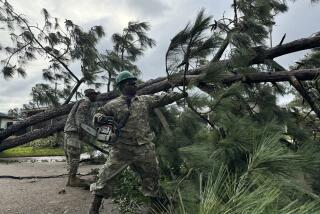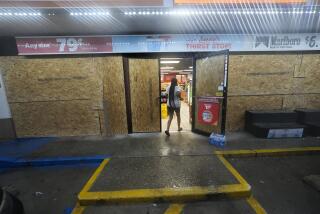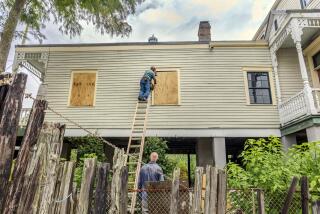New Orleansâ Milieu Threatened as Creoles and Cajuns Disperse
Southern Louisiana endures, and New Orleans is champing to rebuild, but their unique flavor is bound to fade if the French Louisianans donât return.
That community faces âprobably the greatest catastropheâ in its history, said David Cheramie, who directs the stateâs Council for the Development of French.
âWe can rebuild the levees, we can rebuild the buildings,â he said. âBut are the families going to come back?â
When Hurricane Katrina swamped New Orleans, many Creoles and other Francophones were forced into flight to places like Houston and Atlanta and shelters throughout the country.
Many took refuge with friends and relatives to the west, in the stateâs Cajun heartland. Less than a month later, Hurricane Rita ruined homes there, drowned livestock, and forced another exodus northward.
âIt is a blow,â says Barry Ancelet, a Cajun professor specializing in language and folklore at the University of Louisiana at Lafayette. âA lot of those people are not going to come back.â
But, he added, âWe have survived lots of blows.â
In fact, French Louisiana has been clinging tenuously to its identity -- while constantly reshaping it to enfold new arrivals -- for decades.
It traces its origins along separate roots stretching back to early America: Cajuns descended from Acadian settlers expelled from what is now eastern Canada; black or mixed-race Creoles from the Caribbean, West Africa and elsewhere; and white Creoles largely from France. Some native people also took up French through close contact with Francophones.
They tended to dominate early Louisiana life and government into the 19th century. While often distinct in dialect and other folkways, they share a legacy of French language and culture, long proximity and generations of intermarriage. They favor Roman Catholicism, spicy cuisine, pulsating folk tunes, strong family bonds and resilience in the face of hardship.
But resilience wasnât always enough. Burdened by a hard land and rough treatment by outside society, many went looking for better opportunity and melted away invisibly into American life during the 20th century. Others fled earlier insults of nature like the great Mississippi floods of 1927 or Hurricane Audrey 30 years later.
The percentage of Louisianans who claim French ancestry slipped 1 percentage point in the 1990s, down to 12%, according to U.S. Census data. With French long shunned in schools, fewer than 200,000 Louisianans -- not even the population of one big city -- still speak Cajun, Creole or French at home.
âWe used to speak it a lot,â says Wilbert Thomas, a Jefferson Parish evacuee with Creole blood who came to Camp Edwards, a military post at Bourne, Mass., with the first stream of refugees from Katrina. âOver the years, itâs a dying breed.â
Mindful of its cultural cousins, the greater Francophonic world -- places like France, Quebec, Belgium, Switzerland -- have showered Louisiana with offers of help.
France dispatched its U.S. ambassador to inspect losses firsthand. France Louisiane, a Paris-based cultural group, donated $48,000 âto help our friends,â says leader Michele Eccart. A small Acadian society in Massachusetts added $500.
Some French Louisianans are already giving up, though. âItâs time for a new beginning,â declared Jerome Beauvais, a New Orleans Creole, who had never flown until emergency personnel herded him toward a plane for Massachusetts after Katrina. âI ainât going to miss nothing.â
Norbert Billiot, a native Houma Indian, said he probably wonât resettle in the swamped homeland of his Francophonic people south of New Orleans. He and his wife have taken up in central Louisiana.
âEverybodyâs all spread out now,â he said.
Monique Verdin, of New Orleans, dodged both hurricanes and ended up in Florida. She talked of staying there -- but with regret: âHome is the place where everyone speaks French and practices their culture. And if homes are gone, thatâs lost.â
Cultural keepsakes, from photographs to furniture, are gone too, swept away or buried in the muck. Warren Perrin, a Cajun who is one the foremost promoters of Louisianaâs French heritage, bewailed his lost family history at his motherâs flooded house in Henry.
âMom left with nothing,â he lamented. âSo all the memorabilia, the documents, the childhood toys -- itâs gone. I literally cannot walk into the house.â
Some historical treasures -- books, photographs, artifacts, family histories -- were also spoiled by floodwaters at the Acadian Museum in Erath, according to Perrin, its founder. Three families of Katrina evacuees temporarily housed at the museum annex had to flee again in advance of Rita.
On relatively high ground, the French Quarter of New Orleans escaped the worst of the floods. Yet some say that genuine French Louisianan food and music were already endangered in that city, where 8% now claim Francophonic ancestry. Some wonder if New Orleans will be reconstructed with its grinning tourist facade, but even less of the local clientele and soul of French Louisiana.
âI ... fear the Disneyfication of the French Quarter with all this money: people coming in and buying up bars, music clubs, old restaurants -- and naming drinks âKatrina,â â said John Crouch, whose French mother settled in New Orleans because she felt more at home there.
Vicki Cappel, a Cajun who expects to resettle outside the flooded city, chafes at the thought of more restaurants âwhere they take a bottle of red pepper, pour it over everything, and they give it a Cajun name.â
Still, many have returned to their homes in southern Louisiana or intend to, especially Cajun families tied to the land by farming and fishing. âItâs their life, itâs what they love. Itâs their own breed,â said Ron Miguez, a Cajun who came back to Abbeville to find many of his familiar surroundings wiped away.
Gloria Perry, a Creole in the Massachusetts shelter, intended to go home to New Orleans. âYou put one foot in front of another,â she said. âLook at what my ancestors did.â
Gracie Beauvais saw it differently. She never learned to speak her motherâs fluent French anyway. She talked of staying in Massachusetts with her son.
What about missing home? âI can make gumbo,â she said. âOnce you learn how to do it, you can do it anywhere.â
More to Read
Sign up for Essential California
The most important California stories and recommendations in your inbox every morning.
You may occasionally receive promotional content from the Los Angeles Times.










